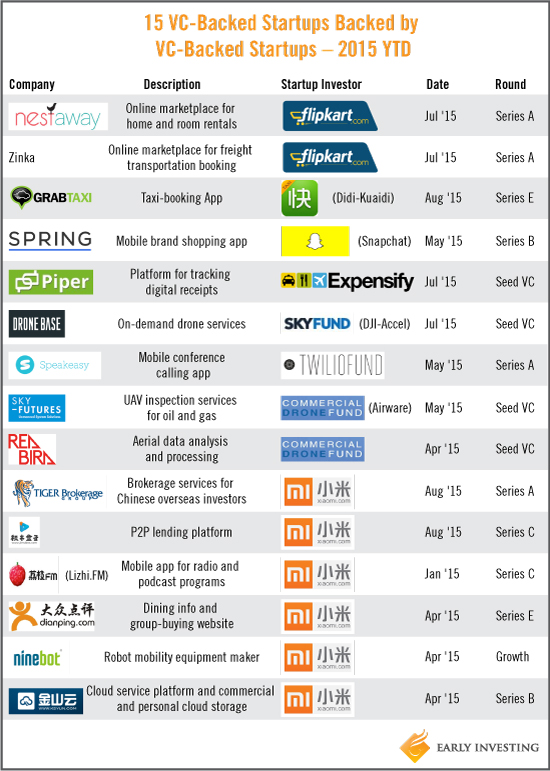Why Are Startups Investing In Startups?

On the last day in July, Baidu (BIDU) announced that it will buy back up to $1 billion of its shares. Baidu is China’s huge Internet search provider.
Three weeks earlier, China Vanke (CVKEY) said it would repurchase $1.6 billion worth of shares. China Vanke is the country’s biggest residential real estate developer.
And in August, Alibaba (BABA) blew both companies out of the water. It said it will be buying back $4 billion worth of shares over the following two years.
Alas, these moves to bolster the price of their companies' shares did nothing to keep the Chinese stock market from plummeting. So the government created a $19.3 billion fund to bankroll further repurchasing of shares.
The Chinese leaders are simply dipping into their old bag of tricks. Here is what they did back in 2008. Like today, China’s markets were nose-diving (back then, from the near takedown of the global financial system)…
If the Chinese government gave lessons on how to artificially prop up markets, its go-to move would be getting companies to buy their own shares. It’s naked stock price manipulation – a Band-Aid approach to dealing with market bubbles. It’s also bound to make things worse at the end of the day.
Startups Investing in Startups
But there’s something that concerns me more than companies buying their own shares.cIt’s startups buying shares of other startups.cAnd I’m seeing it happen more and more.
Is it a sign of too much money sloshing around the startup ecosystem?vOr is something else going on?
For example, why did Expensify - an online expense-management startup – start its own corporate venture unit called Expensify Ventures?
Expensify has raised all of $27.2 million. Its last round was in July. It raised $17 million in a Series C. Last September, it raised $3.5 million.
I can’t imagine Expensify taking this step without the backing of its early investors. They must have agreed to Expensify using their money to invest in even smaller and earlier-stage startups than Expensify itself.
Expensify is part of a larger trend…
DJI hails from China and provides commercial and recreational drone systems. It has partnered with VC firm Accel Partners to form a venture fund called SkyFund.
Twilio has joined forces with three of its investors – Bessemer Venture Partners, Redpoint Ventures and DFJ – to form TwilioFund.
Other startups have become startup investors with their own money. Indian company Flipkart has invested in two startups. Chinese startup Xiaomi has invested in 13 companies.
Using CB Insights data, the table below lists 15 startups that have received an investment from other venture-backed startups since the beginning of the year.
The chart doesn’t include hyperactive startup investor Alibaba. The Chinese e-commerce company invested in 25 startups before it went public September 19 last year (and 20 since).
What do these startups investing in other startups have in common? They’re mostly Unicorns. Companies like Expensify are the exception, not the rule.
As we’ve explained in the past (read this article or this article), many of these Unicorns are waiting longer to IPO. In years past, the Xiaomis and Flipkarts would already be public companies.
Instead of talking about startups investing in startups, we’d be talking about public companies investing in startups. That’s a different narrative altogether. And a different risk scenario for startups and their investors.
So, this is what worries me…
If the market for startups dries up (for whatever reason), then many startups would take a double hit. A direct hit from investors. And an indirect hit from investors via Unicorns no longer flush with cash.
I’ve never boarded the bubble bandwagon. I think it’s overblown to a large degree. But this – startups investing in startups – makes me nervous.
Shouldn’t the founders of Expensify be spending every bit of their energy on growing their company? Sure, they live and breathe the fintech sector. They no doubt have a better feel than 98% of VC investors on which startups have a good shot of succeeding. This is just leveraging their knowledge, right?
What’s Wrong With That
But it’s hard to get away from the notion that the Expensify founders are also hedging their bets, as in…
If our company doesn’t make it, certainly the startup portfolio we’re building will have a couple of big winners.
If so, that’s not a 100% commitment to the growth and success of their own company.
I just don’t like this trend. It’s not just that optimism is overriding caution – a typical bubble dynamic. It also makes the startup space more vulnerable to a slowdown of funds.
We’re not in “watch out below” territory yet. I have to see many more signs before I utter those three words. But my radar has been raised.
And if I do see further signs, I’ll be sure to tell you about them from now on.
Invest early and well,






Remember those companies that took over lots of other companies as an investment tactic prior to the last crash? Most of them are not around.